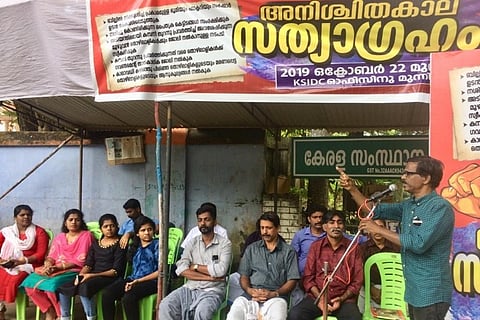

They were 107 of them when they started their fight in February 2009. Today, they are 103 as four among them died over the years. They have been sitting out outside the Kerala State Industrial Development Corporation (KSIDC) office in Kozhikode for the last 131 days. These are the skilled weavers and staff of more than a century-old weaving factory in Kozhikode called the Commonwealth Trust (Comtrust) Handloom Weaving Factory.
On February 2, 2009, the Comtrust Handloom Weaving Factory, which is one of the prestigious weaving factories in Kerala, was shut down due to financial losses. Since then until today, they have been asking for the same three things — reopen the factory, give jobs to all the labourers and pay pending salaries.
According to EC Satheesan, a leader of the All India Trade Union Congress (AITUC) and convener of Comtrust protests, the labourers lived in utter poverty yet continued to fight for jobs and wages. Some took up daily wage work to sustain their families. Later, in 2012, when the Kerala government passed a Bill taking over the company, the labourers started receiving Rs 5,000 per month as compensation. However, in 2016, the then state Industries Minister EP Jayarajan stopped this compensation, stating that the factory was not functional.
“We immediately approached the Kerala High Court to challenge it. Now, we have been receiving the amount every month, but our main demands are yet to be answered," Satheesan told TNM.
The starting salary of an employee at Comtrust was Rs 5,000 in 2009. "We had low pay in the company, but we were happy that we had a job. When it closed, all of a sudden, our hopes were dashed," Shaji, who worked as a weaver at the Comtrust factory, said.
“It has been 11 years now, but we are not tired of fighting for our basic demands. We will fight till justice is served," he added.
A long drawn-out battle
After the closure, in 2010, the Kerala government passed an ordinance to take over the company and its properties. However, this did not happen as it did not get the approval from the Centre. In 2012, the Kerala Legislative Assembly passed the Commonwealth Trust, Kozhikode (Acquisition and Transfer of Undertaking) Bill was passed.
The former employees were relieved. However, other than KSIDC allotting a stipend of Rs 5,000 every month, nothing substantial happened, said Satheesan. Besides, although the Bill was passed in 2012, it took another six years for it to reach the Centre and get the Presidents’ approval.
"On February 1, 2018, the President signed the bill,” said Satheesan.
Even after the President signed the Bill, the company did not reopen. Besides, the weaving machines that would cost lakhs were almost ruined by then. In fact, in 2014, the Archaeological Department had issued a notice to the District Administration, pointing out that the buildings and the equipment of the factory need to be protected immediately.
According to employees, till 2009, the factory had been exporting materials to foreign countries.
“The company had good business when it closed down in 2009. They were getting a good number of orders from foreign countries. Yet, it was closed down due to vested interests. Even the delay today is to sell the land to land mafia which is eyeing the land," alleged Satheesan.
History of the weaving factory
The weaving factory was established in 1844 by a German Protestant Christian Missionary society called the Basel Evangelical Missionary. Hermann Gundert, a German linguist who had contributed a lot to the Malayalam language, came to Kerala as part of this missionary group.
Earlier, weaving was only carried out by the Chaliyas community, who had migrated from Nagercoil and Tirunelveli. That is when the Missionary introduced modern looms: European-frame loom, dyeing-based chemical processes, mechanised yarns, steam engines for spool winding and dyeing, says a book titled, ‘Basel Mission Industries In Malabar And South Canara (1834-1914): A Study of Its Social And Economic Impact’, written by professor Jayaprakash Raghavaiah.
They manufactured all types of clothes, including shirts, pants, dresses, pajamas, cotton bed sheets, table cloths, Turkish towels and some specialised types of cloth, reads the book.
After World War 1, the company was taken over by another British company named Commonwealth, based in London. In 1977, it was registered as an Indian company. Since then it has been a trust-owned factory.